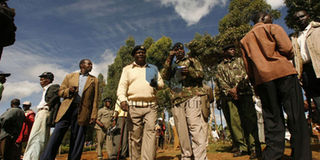Mungiki kill villagers in night raid

Security officers at the scene where 28 people were killed Monday night by suspected Mungiki sect members in Gathaithi village, Nyeri East district. Photo/ JOSEPH KANYI
What you need to know:
- The Mungiki are believed to have regrouped in Karatina after villagers, fed up with the sect’s tyranny and extortion, had smoked them out.
- Youths from Gathaithi village armed with pangas and rungus, on learning of the attack, started patrols of the area even before the provincial security team left.
- Police say that 62 suspects, who had been arrested, would be charged with the killings.
They crept out of the night like ghouls, dozens of Mungiki followers, the axes, pangas and rungus in their hands betraying their intentions: to kill.
In their wake, they left devastated families, mutilated bodies and a despairing sense that the spreading pools of blood could well cover the whole land.
The sect had regrouped to retaliate the killing of 14 of its members by vigilantes. They selected Gathaithi village in Nyeri East District in Kenya's Central Province and planned mass murder with cold blooded precision.
Central provincial police boss John M’Mbijjiwe said: “The attackers burnt a house to attract as many villagers as possible and then lay in wait for them and butchered them.”
At 2.30am, they set the house on fire, burning to death two of the occupants, and lay in wait for villagers to respond to the cries of distress.
When the villagers and vigilantes came out to help, the Mungiki set on them, one after the other as they arrived at the burning house, hacking 18 to death on the spot with axes and machetes and abducting seven others. Seven were also killed at Kiaruhiu trading centre.
In the cold light of the mountain morning, the village was a scene from hell: there were bodies strewn all over, with cuts in every part, some with throats slit. And the soil was spotted with blood.
The Mungiki are believed to have regrouped in Karatina after villagers, fed up with the sect’s tyranny and extortion, had smoked them out. The attack came barely an hour after a police patrol had passed through the village.
There had been rumours that the sect was regrouping to avenge the killing of its members by villagers and the police had stepped up patrols.
Extreme violence
The village had a well-organised group of youths to guard it from the Mungiki. The vigilantes even had a code name – Bantu – which they used to identify each other in the dark. The sect had investigated all that and used the same code to confuse the vigilantes.
Distraught villagers, numb with fear and horror, watched silently as Central provincial commissioner Japhter Rugut and the entire security team viewed the bodies of the victims where they lay, before they were transferred to Karatina Hospital Mortuary.
Villagers said they were shocked by the brutality and extreme violence with which the Mungiki massacred locals. Bodies had many deep cuts and some bodies had limbs completely severed. The body parts littered footpaths and the surrounding area.
In the burnt house was a body that was completely consumed by the flames. Another was partially burnt and deep cuts on the head were clearly discernible. Detectives thought the victim was killed as he tried to escape the fire.
The owner of the house, 70-year-old Esther Wangui Mathenge, said the two were her farmhands. The two, she said, were from the neighbouring Kirinyaga District, where some Mungiki members have in the recent past been lynched.
At Kiaruhiu trading centre, the Nation counted seven bodies, all male, while at Gathaithi, scene of the massacre, there were 18 bodies, some of them hidden in tea bushes.
The killings took place on both sides of River Wamuthambi, which divides Nyeri East and Kirinyaga West. Here the Mungiki has been extorting a toll on households, traders and matatu owners.
Central provincial police officer John M’Mbijjiwe said 62 suspects, who had been arrested, would be charged with the killings.
In an ominous sign that this is far from over, local youths armed with pangas and rungus, on learning of the attack, started patrols of the area even before the provincial security team left.
They swore they would kill all Mungiki members in their midst, but were warned by Mr Rugut against taking the law in their hands.
Tension was so high that a man who was injured in the attack and hid in a tea plantation in Mathaithi village was nearly hacked to death by the villagers when he came out of hiding. He was later taken to hospital.
The PC condemned the killings and asked Mungiki members to abandon their life of crime and surrender to the authorities.
The attackers started their mission at Ms Mathenge’s house, where they smashed windows and roughed up the elderly woman, accusing her of sympathising with villagers who are out to finish Mungiki.
At the timber house where her workers slept, they killed one worker and set it on fire with two inside. On Tuesday, Ms Mathenge was still in shock and could not even remember the names of her workers.
Twenty two-year-old Jemimah Wanjira was in the house that was burnt. Her husband, who was in the house with her, is missing and is yet to be found.
“They started throwing stones at the house but when my husband came out, they started hitting him up with pangas. They later flushed me out together with my two children and ordered me to sit on the grass as they torched the house,” she said.
Ms Mathenge said the man who was burnt beyond recognition was Ms Wanjira’s husband.



